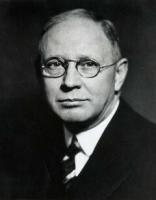Georg Simmel: biography of this German philosopher and sociologist
Throughout history, different cultures and societies have been born, developed and died, generating a large number of ways of thinking and seeing the world. Philosophy and sociology are fundamental elements to understand not only his evolution, but also the very functioning of society and the discussion regarding multiple aspects of life.
There have been many authors who have developed both disciplines, but not so many who have gone on to carry out microsociological analyzes such as interpersonal relationships or the structuring of reasoning. One of them, who would serve as a precursor to symbolic interactionism and the scientific development of sociology, was Georg Simmel. This author participated in the early stages of sociology and developed his own philosophical thought.
Throughout this article let's see a short biography of Georg Simmel.
- Related article: "Gregor Mendel: biography of the father of modern genetics"
Brief biography of Georg Simmel
Georg Simmel was born in Berlin on March 1, 1858, being the seventh and youngest child of Edward and Flora Simmel. His family, of Jewish origin, was prosperous and cultured, although his relationship with his mother was never close as she was excessively authoritarian. Despite this, and regardless of whether his parents had converted to Christianity,
throughout his life he had to face an anti-Semitism widely spread in society.His father died in 1874, something that would end up putting his family in a precarious economic situation. At that time a family friend, Julius Friedländer, took over and became little Georg's tutor. Thanks to him he was able to study at a Gymnasium in Berlin, finishing high school before entering university.
University training and beginning of teaching activity
After completing primary and secondary studies, Simmel enrolled at the University of Berlin in order to study philosophy and history, subjects in which he was deeply interested, in addition to attending lessons in social studies and psychology.
During his training, which he carried out entirely in Berlin, he made contact with important philosophers, anthropologists and psychologists and would study works such as Kant's. Despite this, he had difficulties during his studies: in 1880 the university rejected a work that he intended to use as a doctoral thesis, referring to the origin of music. Fortunately, and after changing the subject towards metaphysics, he managed to get a doctorate with the thesis The nature of matter according to Kant's physical monadology (thesis that even received an award from the kaiser).
After finishing his studies, he obtained, not without some effort, the authorization to be appointed privatdozent, private teacher, in 1885: a position little valued but that allowed him to remain in contact with the college. Despite this, his great training and interest in multiple subjects made him a deeply popular teacher and loved by his students. students, since in addition to working on unusual areas of philosophy, he tried to bring them closer to close topics for those who attend.
- You may be interested: "The main types of sociology"
Publications and personal relationships
Likewise, during this period he would also begin to write publications that little by little would gain more and more prestige, even at an international level. In 1890 he married Gertrude Kinel, a painter and intellectual with whom he had a son., and from the hand of which he met and established a good relationship with thinkers such as Max Weber.
In this context he began to elaborate some of his most relevant philosophical works, introducing and being one of the forerunners of sociology as a science with publications such as On Social Differentiation or Introduction to Science moral, in which he worked on topics such as sociology or the impossibility of working on a scientific ethics beyond mere description.
In addition to this author, Simmel began to hold several gatherings with great authors such as Stefan George, Edmund Husserl or Walter Benjamin. He likewise made several trips to Italy. In 1900 the University recognized his many contributions by appointing him extraordinary professor, but despite this not accepting him as a professor (something that caused the indignation of many intellectuals).
In 1908 he published Sociology, helping to base this discipline on a scientific level. Also at this time he focused on the concept of life, leaving aside the field of sociology as such as entering a more metaphysical and existentialist area.
Despite the marginality to which his origin condemned him, he managed to found the German Sociological Society together with Weber. Around 1914, coinciding with the First World War, the University would finally give him a chair.
Legacy in Sociology and Philosophy
Unfortunately, throughout 1918 the author contracted liver cancer, which ended up causing death shortly after. Georg Simmel died on September 28, 1918, in the city of Strasbourg. In his last year he would produce publications such as The conflict of Modern Culture or Intuition of life: four metaphysical chapters, in the latter of which we see the metaphysical position of him in his later times.
Simmel's contributions are unspeakable: despite being relatively little known and marginalized by the academic world of his day, he contributed greatly to establishing sociology as a science, working on aspects such as authority and individuality or relationships personal. He was also a controversial and interesting philosopher who touched on topics such as immortality, relativism morals, life, love and ethics, and whose works inspired numerous authors later.
Bibliographic references:
- Rammstedt, O. and Cantó, N. (2000). Georg Simmel (1858-1918). Papers, 62: 11-24.

